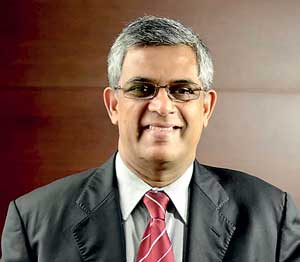Wednesday Feb 18, 2026
Wednesday Feb 18, 2026
Tuesday, 26 December 2017 00:00 - - {{hitsCtrl.values.hits}}
By Charumini de Silva
In the wake of the new SEC Act to be passed in Parliament next month, the Colombo Stock Brokers Association (CSBA) is looking forward to promised reforms and instruments to be implemented to further expand the market as well as to gain its trust and confidence.
“We are hopeful that the New Act will be passed on 24 January, where much of the proposed initiatives including demutualisation, the central counter party (CCP) system, derivatives which are critical to broad base the capital market activities would be introduced to bring back the confidence in the capital market,” CSBA’s Immediate Past President Ravi Abeysuriya told Daily FT.
The main feature of the new SEC Act would be the vesting of powers on the State to initiate civil action against the alleged capital market offenders, thereby giving more teeth to the SEC, which currently has limited scope in penalising wrongdoers, since criminal action requires proving an infraction beyond reasonable doubt.
“The new Act will bring back the confidence that was demolished drastically over the recent past, as wrongdoers can now be punished under civil proceedings. It will provide more stern punishments for false trading, market rigging, market manipulation and insider trading to establish a fair and transparent capital market,” he added.
Highlighting the importance of State-owned Enterprises (SOEs) getting listed in the CSE, Abeysuriya stressed the public must fully understand that the proposal to list on the stock exchange does not mean ‘privatisation’, but a process to turnaround those entities more transparent and efficient.
“It is critical to get the SOEs and the non-core businesses listed in the Colombo Stock Exchange (CSE) to attract more funds for the growth of the market. Listing a small share of the SOEs would enhance the transparency, good governance and accountability, while it will also make those institutions more efficient. It will also provide an opportunity for the people to benefit from the profitability of those institutions,” he said.
However, he raised concerns on the implementation as all these initiatives will also depend on the political stability of the country with the local Government elections scheduled to be held in February.
“Political stability is critical to attract the much needed foreign investors towards the country. With many debt repayments scheduled for the next few years, it is imperative for the Government to stick to the set targets in order to obtain a better country ranking as well as for a stable economy,” Abeysuriya stressed.
Referring to the recovery of the US economy, he cautioned that would have some impact on frontier markets as the US market is performing well with drastic cuts in taxes to push the bullish momentum further.
Despite 2017 being a record-breaking year for foreign portfolio investments in the capital market, the Colombo Stock Brokers Association (CSBA) claimed the overall performance this year has been extremely disappointing.
“The market performance was not encouraging. We are not at all satisfied with the performance of the Colombo stock market this year. The industry is shrinking,” CSBA Immediate Past President Ravi Abeysuriya told Daily FT.
He said although the foreign portfolio investments throughout the year had been considerable compared to the previous year, from a local investor perspective the market was quite dull with less participation of both retail and institutional investors.
Foreign portfolio investment in the Colombo stock market in 2017 recorded an all-time high in foreign purchases during any given year, with Rs. 110 billion (year-to-date) surpassing the previous record of Rs. 104.7 billion set in 2014.
According to him, the delays in implementation of proposed reforms, initiatives and particularly the investigations that were carried out on institutional investors were key reasons for the bearish market seen throughout the year.
In the back drop of the dull market behavior this year, Abeysuriya pointed out that many of the equity brokers struggle to avert shutdown. “Most of the brokering firms are running at a loss and as a result few firms had to close down some of their branches this year.”
Noting that the debt market was quite active this year, he outlined that it was important for private firms to strike a balance between debt and equity. “Debt and equity go hand in hand. Raising too much debt is not healthy; the firms must have an exit plan, too. What we want to see is more listings in the market with more active participation from retail and institutional investors.”